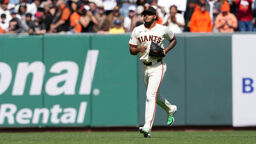(This story was published in 2007).
Ultra-endurance athlete Christopher Bergland has never taken shortcuts.
Openly gay, he is the three-time winner of the Triple Ironman race (7.2-mile swim, 336-mile bike, 78.6-mile run) and holds the world record for number of miles run on a treadmill in 24 hours (153.76 miles). The treadmill run literally almost killed him. So, when it came time to write a book, “The Athlete’s Way: Sweat and the Biology of Bliss,” his first manuscript would not be the Cliff Notes version — it registered at 4,000 pages, “most of it single-spaced,” he said.
|
“You’ve done it again, Chris,” he remembers himself thinking at the time, after spending five months isolated in Provincetown in 2005 writing it. He turned in 1,000 pages to his editor at St. Martin’s Press and at publication this June it came in at a svelte 340 pages.
The result is a highly entertaining, informative, accessible, insightful and practical guide to fitness, health and life in general from an elite athlete who never preaches down to his readers, many of them likely to be weekend warriors or couch potatoes.
Bergland, 41, has run the Badwater Ultramarathon, 135 miles of hell through Death Valley in the middle of summer, three times. A 10-mile run for him is the equivalent of a stroll around the block for most people. Yet the goal of “The Athlete’s Way” is not to make the rest of us into super athletes, but rather to tap the athletic potential in all of us, no matter how advanced.
Bergland, who lives in Manhattan, is an engaging tour guide. The book is not a dry recipe of how-tos. The reader gets to know the author — from his days as a depressed, cynical and drug-using gay teen, through his bourgeoning athletic successes and to his latter years that saw him deal with the stress and trauma of being mugged in a Manhattan park.
“The person I want to read this book is someone who doesn’t like exercise,” Bergland told Outsports. “That would be my No. 1 mission, as sort of a zealot to convert people who don’t enjoy exercise into people who seek exercise. I try and make it very seductive and enticing.”
The subtitle, “Sweat and the Biology of Bliss,” is fitting. “Sweat equals bliss,” he said. “Sweat actually makes you feel really good and is a pleasurable experience and I’m going to prove that to you, the reader.” He calls breaking a sweat, “the passport to join the athlete’s way culture,” adding, “anyone who seeks exercise regularly with intent is an athlete. The athlete’s way and athletic mindset is a code I strive for.”
The book is laid out on 12 chapters. The beginning deals with his personal story, then delves into the biology of sweat and the brain. It ends by focusing on all aspects of training, from diet to sleep to stretching to types of exercise. The son of a neuroscientist, Bergland explains the science of exercise. “The book brings neuroscience to the mainstream public and that I knew I had enough credentials to be considered an expert in the field,” he said.
“I know I’m a freak … but I also started where you are at 17,” is his answer to those who feel intimidated by the thought of starting and maintaining an exercise program. The book details an eight-week program, and he encourages newbies to “take baby steps.” His minimum amount of weekly exercise is 120 minutes.
“It’s not too late too late to start you need to do it for yourself, your loved ones and your kids,” he said. “You need to take care of your body because it will be too late if you don’t. Start today.”
He is not a Puritan when it comes to diet, saying he still partakes of fast food and donuts when the cravings strike. “I have no dietary rules whatsoever, none, zippo,” he said. “The only rule I have is calories in, calories out. I don’t forbid foods, I know what’s healthy and myself I make 75% every day good choices without being neurotic. And then there’s leeway.”
He breaks down weight loss in a simple way. “You can begin to assume that 3,500 calories is a pound of fat and if you are 10 pounds overweight, you need to do two things,” he said. “You need to bump your caloric expenditure up, you need to burn 250 calories a day and cut 250 calories a day. Find places where you can cut 250 calories without feeling deprived. If you continue to do that, you’ll flip the table that caused you to be 10 pounds overweight.”
Among the best parts of the book are the hundreds of inspirational quotes sprinkled throughout the text. He quotes people as diverse as Einstein, Sir Francis Bacon, Tina Turner, Helen Keller, Wayne Gretzky and Gen. George Patton, using aphorisms that are funny, inspirational or insightful. “Success consists of going from failure to failure without losing enthusiasm,” is one from Winston Churchill. In typical Bergland fashion, he compiled the quotes from thousands he had saved on index cards over many years.
A new path through exercise
If Bergland is an evangelist for the power of exercise, it’s easy to understand since it changed his life. He discovered sport at 17 and used it “to pull myself up and get back in the game of life,” he said. “I went from being a really depressed and kind of jaded and cynical kid — I used a lot of drugs and alcohol — and dealing with being gay in a really uptight boarding school. But that summer I kind of metamorphosized, not only physically, but my brain changed. I went from being very cynical to being very optimistic and ambitious and eager to seize the day. Exercise transformed my perspective on the world and gave me the confidence as a gay teenager to be my own person and to have a lot more resilience and like a spine of steel.”
Bergland went on to be a highly success endurance athlete, called by one writer “the greatest athlete you’ve never heard of.” In the book he breaks down the number of miles he has run on a treadmill since 1984 and comes up with 50,000. In addition to his wins in the Triple Ironman races, he has run in dozens of regular Ironman races and even won a gold medal in the triathlon at the Gay Games in New York in 1994.
Despite his successes, Bergland, still lean and very fit at 6-1 and about 170 pounds, writes that “many people think that ultra-endurance sports are crazy. Even though I loved doing them, I have to agree. … The physical strain on the body is, in fact, probably bad for you. My joints are fine, but my kidneys have been pushed to the verge of shutdown a few times. Twenty to 60 minutes a day is good for you, but running nonstop for 24 hours is not. I did it because it was my calling — my life’s passion.”
It was a passion that nearly killed him. Bergland gave up competing after making the Guinness Book of World Records with his 24 hours nonstop on a treadmill on April 3, 2004 (another athlete tried to beat Bergland’s 153.76 miles this June, but failed). His feat earned him the record but also landed him in the hospital with kidney failure. It was a wakeup call. “I had sort of achieved everything I had wanted as an athlete to the point where raising the bar any higher was becoming self-destructive,” he said.
Bergland then dove headfirst into the book and his obsessiveness led him to what he called his “meltdown phase” in October 2005 after five months of living like a hermit in P-Town, writing hundreds of pages a day. On Cape Cod, he had his second major bout of depression, his first since a teenager. He reached out to his family and friends, who provided him with support and a valuable lesson. “The message of my book about the importance of community came from this isolation” while writing the book, he said.
A second traumatic event that tested him came in August 2003 when he was mugged by three teens while walking back from dinner in Stuyvesant Park, an event he writes about in harrowing detail. “I was like a punching bag at their disposal, face down at first and then curled up in a fetal position getting kicked primarily in the torso and head. … It felt like being in an industrial washing machine with about eight cinder blocks.” Bergland supplies an apt quote in this section from football coach Woody Hayes — “There’s nothing that cleanses the soul like getting the hell kicked out of you.”
The muggers got away with “a pack of spearmint Dentyne gum and a $5 bill, ” he writes, and Bergland went to the ER but amazingly had no brain damage or debilitating injuries. Deciding not to let fear rule him, Bergland journeyed back to the place in the park where the mugging had occurred. “Every day for weeks,” he writes, “I went out of my way to go back to that slab of stone to stand on it, alone, look around, and proceed home. It was like a pilgrimage, a very therapeutic one.”
Today, Bergland works as a manager for Jackrabbit Sports, a running and fitness store in Manhattan, and also as a representative for Kiehl’s, which makes skin and hair care products. He went to Death Valley this month for the Badwater Ultramarathon, not as a runner but as a Kiehl’s rep.
Single, Bergland will have a major life change this October when he becomes a father. He is having a baby with a straight female friend through in vitro fertilization. He plans to split his time between New York and the Bay Area, where the mother and child will live.
He admits that he has to rewire himself and “learn to hang out.” Not many babies are up for a 135-run through the desert. But not even fatherhood will slow down Bergland from being an advocate for his “sweat equal bliss” philosophy.
“I hope that this book in its own way inspires people and not only in sports, but raises the bar so they can push against their own limits and lead a life they can be proud of.”







































